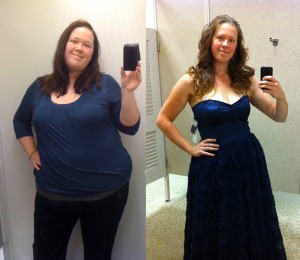UPDATE: 9/24/20 -Julia Kozerski’s web site is apparently no longer up and running. Here are some links that are still working:
- NPR: Losing 160 Pounds, One Photo at a Time
Good interview and a good collection of photos. - The Guardian: Life after extreme weight loss
Several of Kozerski’s photos along with an extended interview - Lens Culture: Julia Kozerski
A collection of Kozerski’s images from her exhibit “Half.” These images are at the core of what Kozerski was trying to say with this project. While these photos are not sexually explicit, they are definitely NSFW.
Two years ago I wrote a post about how photographer Julia Kozerski documented through photos her process of losing 160 pounds. Many of the photos were taken of her trying on clothes for her sliming body while others were unclothed, showing her stretch marks and sagging skin.
 I thought her story in words and photos was incredibly compelling and largely at odds with the stories of weight loss success we are told through magazines and TV.
I thought her story in words and photos was incredibly compelling and largely at odds with the stories of weight loss success we are told through magazines and TV.
This week she published a followup to her earlier work with an article for the Washington Post’s PostEverything blog. In the article, she documents how losing weight didn’t make her happier; in fact, she says that it only made her feel worse about how she looked. She writes:
“But even after I lost weight, I could see that I’d never be Gisele or Heidi Klum. When I looked in the mirror, I didn’t see my slimmer legs or flatter tummy. Instead, there was sagging skin, drooping breasts and stretch marks in shades of purple and red…. Fat or thin, I was a mess. I didn’t love myself and didn’t understand how anyone else could.”
Kozerski goes on to write that what saved her as taking the photos and analyzing them as the photographer, not as the subject of her photos:
“I saw sagging breasts and a scarred bodice but also a person willing to share those scars with others, rather than digitally edit them out of the photograph.”
A must read article on media and body image, along with her online photo exhibits.

Sometimes what we want isn’t always good for us.